Backlash after BBC Scotland recruits Nazi dog salute’ criminal Mark Meechan leaves Airdrie Sherriff Court. Picture: SWNS Published: 09:48 Updated: 09:52 Sunday 03 March 2019 Share this article Sign Up To Our Daily Newsletter Sign up New Age Entrepreneurs: why retirement can be the perfect time for a new enterprise A number of people reaching retirement age are realising that their hobbies can fast become a fulfilling pursuit during retirement. Read More Promoted by 0 HAVE YOUR SAY BBC Scotland’s new digital channel is facing a major backlash after recruiting a criminal who taught his dog to perform the Nazi salute. Mark Meechan will be allowed to air his right-wing views next month on the taxpayer-funded channel, despite his conviction for a “grossly-offensive” hate crime last year. The appointment will outrage members of Scotland’s Jewish community, who already feel vulnerable to what they perceive to be a rise in anti-semitism in the country. Meechan, 31, caused an uproar when he uploaded a video to the website YouTube showing his girlfriend’s pug dog doing the ‘Sieg Heil’ salute alongside obscene Nazi imagery. PEUGEOT 208 Tech Edition. With Park Assist, Active City Brake & reversing camera. Everyone needs a hand in the city. Promoted by Peugeot 208 The provocative blogger, from Coatbridge, in Lanarkshire, also chanted variations of the phrase ‘gas the Jews’, repeating the slur around 23 times in a few minutes. Just this week Meechan boasted to his social media followers that he was still refusing to pay the £800 fine handed to him by a judge at Airdrie Sheriff Court. Meechan will star alongside reality TV personality, James English, and Edinburgh-based dominatrix, Megara Furie. Glasgow Friends of Israel member and prominent Scottish lawyer, Matthew Berlow, said he could not believe that Meehan, who he accuses of making light of the Holocaust, is being given such a public a platform. READ MORE – Swimmer David Wilkie: Should mere mortals like Andy Murray be given a knighthood? He said: ‘It is absolutely sickening and disgusting. Anti-Semitism is a very difficult subject but we Jews know what it looks and feels like. ‘I know that anti-Semitism has become very popular but I don’t think that [Meechan’s politics] can be described as a ‘view’. The Holocaust is no laughing matter.’ Mr Berlow added: ‘We are entering a time now where the generation of Holocaust survivors is dying out. The internet is now becoming a breeding ground for idiots like this. It’s a very great shame. ‘There’s a difference in making fun of Hitler and making fun of gassing six million Jews.’ Man arrested after a suspected stabbing in Edinburgh Swimmer David Wilkie: should ‘mere mortals’ like Andy Murray get knighthoods? The controversial BBC Scotland programme will air in April and will see four people with strong opinions take on the world’s most hotly contested topics each episode. Unlike a panel show, it is up to the regular contributors to lead and present the show and debate between themselves – in the comfort of a living-room style set up, according to one source. Megara Furie, who has previously said she charges clients £150-a-time said of the programme: ‘It’s really getting into the nitty-gritty of things. There were arguments, there were times when we all agreed and there were times when we all vehemently disagreed.’ Last night Scottish Conservative shadow culture secretary, Rachael Hamilton, said that the Corporation needed to reconsider its decision to give Mark Meechan a slot on national television. She said: ‘The promotion of this individual in any BBC programme would seem to be entirely against the BBC charter. ‘If BBC Scotland wants to retain the goodwill of its many audiences it really should reconsider this decision. ‘It would be berlowastonishing if the BBC, in any capacity, was to give a platform to someone convicted of a hate crime.’ Although Meechan’s appeal was not accepted, it is thought he has still not paid his fine. When contacted by the Scottish Mail on Sunday about his co-starring role on the BBC Scotland show, Meechan declined to comment. Last night the BBC said: ‘We had a broad range of contributors in for the recording of a new late night format in which a wide variety of issues are debated and opinions are challenged. “The production is currently in the edit where the content of the programme will be decided, subject to the BBC’s robust editorial review and compliance procedures. “We don’t discuss payments to individuals. When a fee is paid in relation to a production it is in line with standard industry practice.’
Read more at: https://www.scotsman.com/news/backlash-after-bbc-scotland-recruit-nazi-dog-salute-criminal-1-4882454


